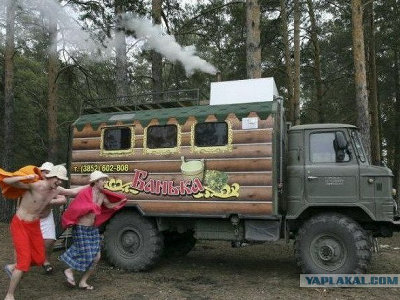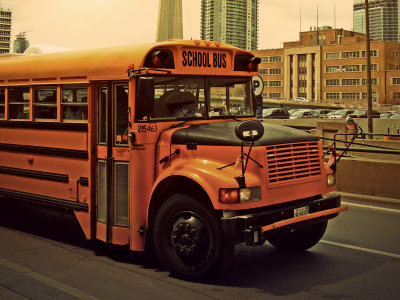If you read the 'Guide to Camping Car Life in Japan' written for overseas, the goodness of Japan seen from overseas will emerge

A European-Japanese couple and a one-and-a-half-year-old child traveled 10,000 km for nine months in a small camper van. We have released a guide for practicing the '
A guide for Van Life in Japan - KumaZen
https://kumazen.com/a-guide-for-van-life-in-japan/
·table of contents
◆1: Overview of van life in Japan and about cars
◆2: Where to sleep
◆3: Toilets and garbage
◆4: About water and electricity
◆ 5: About bathing and washing
◆6: Meals
◆ 7: Security and safety
◆8: Others
◆1: Overview of van life in Japan and about cars
According to blogger Kuma, Japan may be the best country in the world for van life. Mr. kuma cites 'safety', 'free parking and clean public toilets', 'diversity of nature', 'delicious food and cheap eating out' as reasons. On the other hand, there were two negative factors: ``It is difficult to dispose of garbage'' and ``The campsite usage fee is high and the rules are strict''.
After living in the Tokyo metropolitan area for several years, he wanted to experience rural life, and he originally liked traveling and camping, so he started living in a camper. Nothing can replace the wonder of waking up in nature every morning and discovering new places every day.'
Mr. kuma's family uses a vehicle called ' KUMA Q ' based on Toyota's Hiace by a manufacturer called DreamDrive. As expected, there is no toilet or shower, but he likes the fact that it has a full-size bed, kitchen, and plenty of storage space. Also, since he lives with small children, it seems that using wood for the interior was also a point.
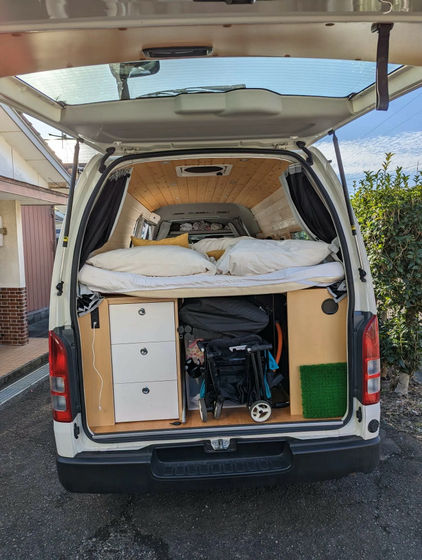
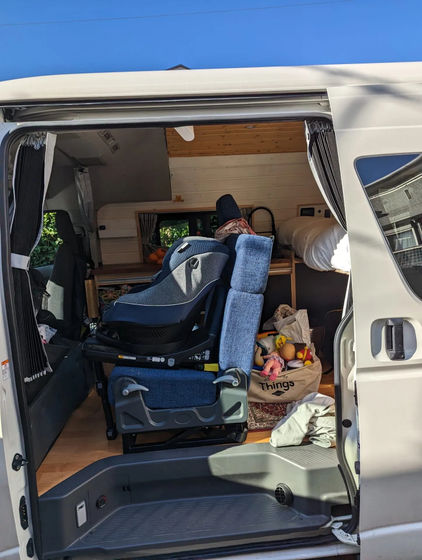
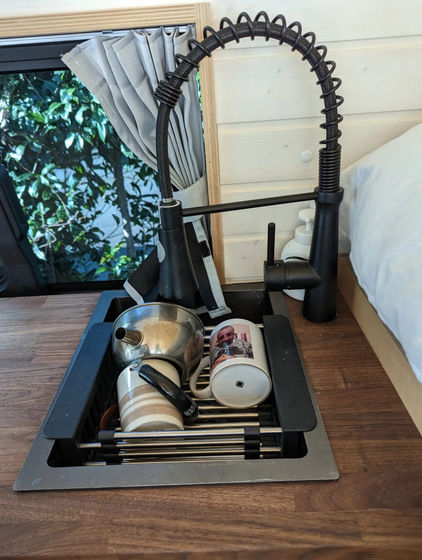
Of course you'll have to drive a car to get around, but Kuma says, 'Driving in Japan is really comfortable. Compared to Europe, people aren't as aggressive, and directions are available in English almost everywhere.' , There is also a convenient Google map, ”he said.
Miyazaki Prefecture, Oita Prefecture, Yamaguchi Prefecture, and Shimane Prefecture are the prefectures that Mr. Kuma and his family particularly like. Unfortunately, he has not yet visited the northern part of Japan.
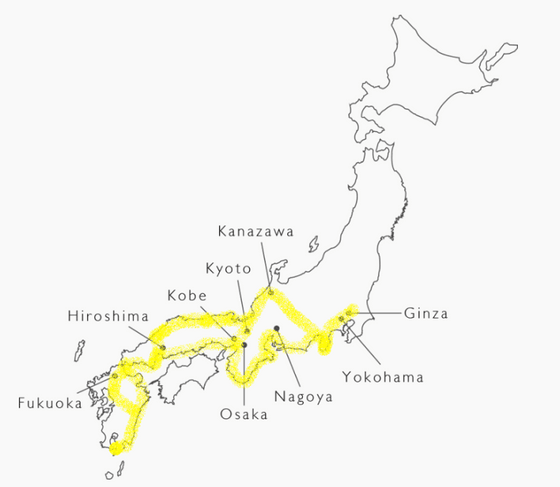
◆2: Where to sleep
70% of the places where kuma and others park their cars and sleep are free parking spaces with public toilets that are common in parks, beaches, and tourist spots. We also use campsites and roadside stations.
Campsites are more expensive, but you can spread out the tables and chairs, relax, and enjoy barbecues. Also, it is a great opportunity to dispose of garbage and replenish after running out of water.
There are souvenir shops and restaurants at the roadside station, but Mr. Kuma says, ``The problem is that it tends to be noisy, especially on weekends, when there are gatherings of truck drivers, young people, and enthusiasts who sleep with the engine running all night.'' I'm doing it.
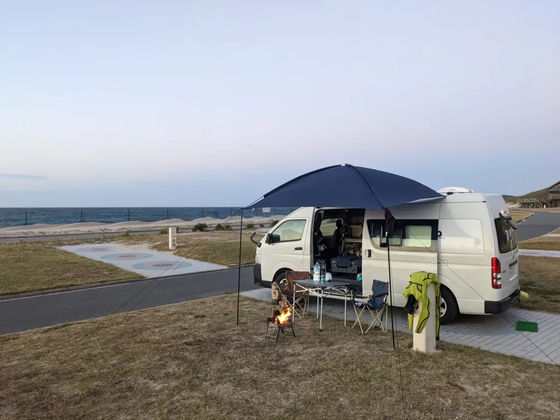
◆3: Toilets and garbage
There are many public toilets in Japan that are clean and free to use, but when spending the night in nature, they sometimes go outside to do their errands. Kuma also advises having an empty container or adult diapers handy so you don't have to get out of the van in the cold.
Japan's public toilets are one of kuma's favorite spots, and he even writes
On the other hand, Japan has strict garbage separation rules, so it is often difficult to dispose of garbage. Therefore, it is good to throw away garbage frequently. Since there is always a trash can in the service area of the toll road, it seems that there were times when the expressway was used to dispose of the trash.
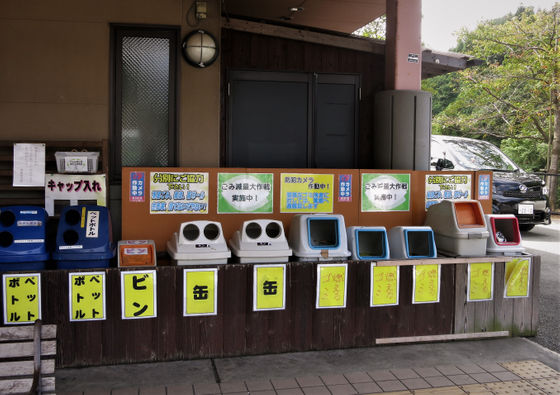
by
Mr. Kuma also reminded us that 'Convenience stores also have trash cans, but you can only use them to dispose of the items you bought at that store, so be careful.'
◆4: About water and electricity
It is easy to procure clean water, and we buy bottled water at supermarkets and drugstores to secure drinking water. Also, the car has a 23L tank, so I store water there and use it mainly for washing dishes.
Taps can be found at beaches, parks, and behind public restrooms. However, I think you need to be careful not to get into trouble. If you can't get free water, use a campsite.
Amazon | Kakudai Shared Faucet Key 2 Pieces 9007 | Outdoor Faucets
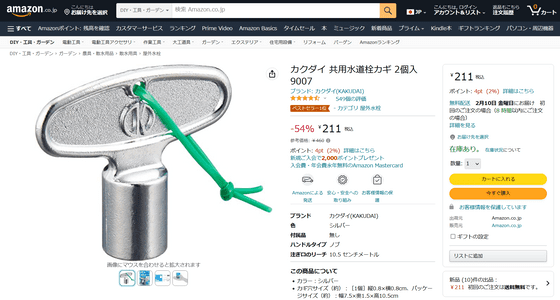
The car is also equipped with a sewage tank, and it is said that dirty water generated by washing dishes mixed with small food particles and environmentally friendly dishwashing liquid is drained from the rain drain.
In addition, Mr. Kuma's car is equipped with two 100 Ah lithium-ion batteries and a solar panel, so far he has not had any problems with electricity.
◆ 5: About bathing and washing
There is no shower in the car, so you wash off the dirt on your body in a hot spring or public bath. However, Mr. Kuma and others do not bathe every day. If you can't find a public bathhouse, you may take a shower at a manga cafe, but the male customers are often quietly reading manga or surfing the Internet, so the atmosphere may be strange for families. No, Kuma said.
Use the laundromat to wash clothes and bed sheets.
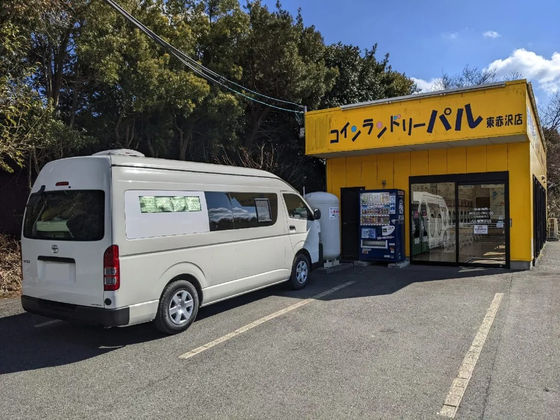
◆6: Meals
Mr. kuma said that he often eats coffee instead of eating breakfast and eats lunch at a restaurant. Also, for dinner, I buy ingredients and cook and eat in the van. The sun sets earlier in Japan than in other countries, so Mr. Kuma enjoys long nights by relaxing with his family while cooking and eating. Kuma also advises cutting up a lot of vegetables at once, putting them in a ziplock bag with the meat and seasonings, and storing them in the fridge to reduce cooking time.
◆ 7: Security and safety
“In contrast to Europe, where laptops and cameras were purposely placed in cars for security reasons, in Japan there have never been any safety issues. I think it's important not to cause trouble for people,' says Mr. Kuma, who gives his stamp of approval to Japan's public safety.
Instead, be careful of natural disasters. In particular, there is a danger of earthquakes, heavy rains, and typhoons, so when you arrive at a new place, you should check the evacuation site, and depending on the conditions, you should consider giving up sleeping in the car. Also be aware of wild animals such as bears, monkeys, snakes, and insects.
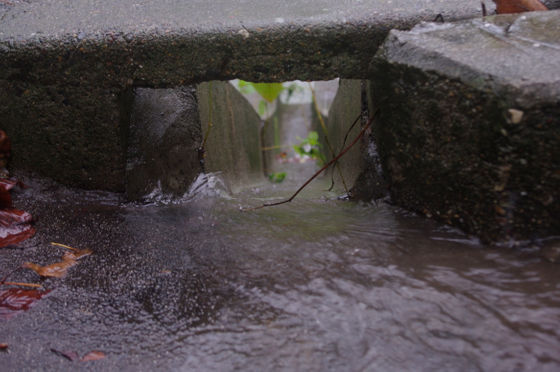
by Tiffany Key
◆8: Others
Mr. kuma said that he registered his address, vehicle inspection certificate, and garage certificate at his family's address. In addition, it seems that the insurance is subscribed to Tokio Marine & Nichido because there is support in English.
Mr. kuma said that he was worried about living a travel life with a small child at first. Although it was certainly difficult at times, kuma says that the experience of walking on the beach and exploring nature should be a wonderful gift for a child who has just started to stand and walk.
However, since I am with my child 24 hours a day, it is difficult to balance work and parenting. Mr. kuma works remotely as a software engineer, and he says he works early in the morning when his family is still sleeping. Therefore, if you have a job that does not allow you to allocate time, adjust the amount of work, or schedule freely, van life as a family is not recommended.
In addition, the following 8 points are listed as convenient goods for van life.
・Cassette stove
・Portable BBQ grill
・Saw for wood splitting
・CO2 sensor
・Drip coffee
・Folding table
・USB lantern
・Portable rice cooker
Mr. kuma summarizes the points to note about van life in Japan, saying, 'Japan is perfect for van life, you can choose where you want to sleep, and you don't have to worry about safety. However, in exchange for freedom, you are always surrounded by You have to be respectful, there are many rules in Japanese culture, foreigners, foreigners and Japanese from other regions should not cause trouble to others, and when it's time to leave It's important to keep things clean, smile and bow.'
Related Posts:
in Vehicle, Posted by log1l_ks

